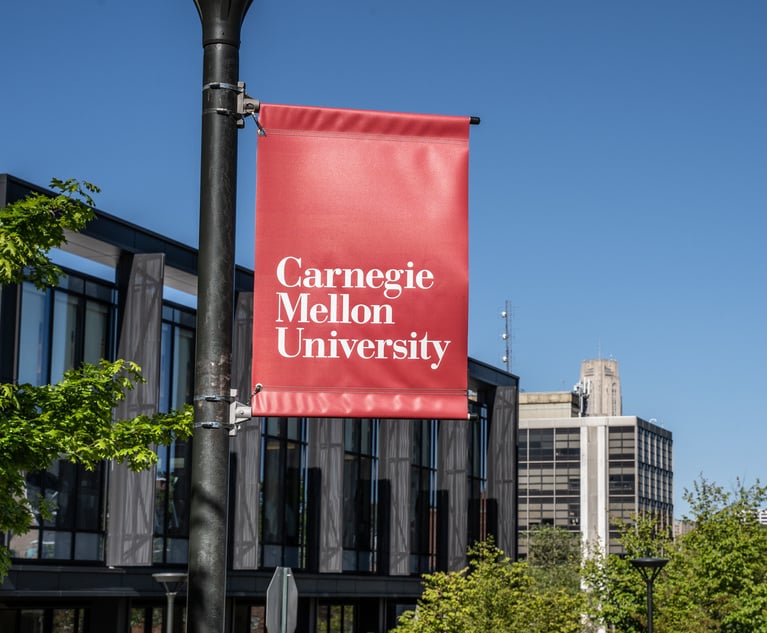Proposed Amendment to Rule 8.4: How Will It Impact Diversity and Inclusion
At its August 2016 annual meeting, the American Bar Association passed a resolution that amended 8.4 of the Model Rules of Professional Conduct to make it an ethical violation for an attorney to "engage in conduct that the lawyer knows or reasonably should know is harassment or discrimination on the basis of race, sex, religion, national origin, ethnicity, disability, age, sexual orientation, gender identity, marital status or socioeconomic status in conduct related to the practice of law."
June 28, 2017 at 12:00 AM
5 minute read
At its August 2016 annual meeting, the American Bar Association passed a resolution that amended 8.4 of the Model Rules of Professional Conduct to make it an ethical violation for an attorney to “engage in conduct that the lawyer knows or reasonably should know is harassment or discrimination on the basis of race, sex, religion, national origin, ethnicity, disability, age, sexual orientation, gender identity, marital status or socioeconomic status in conduct related to the practice of law.” The amendment does not limit the ability of an attorney to accept, decline or withdraw from representation in accordance with Rule 1.16 or preclude an attorney from rendering legitimate advice or advocacy consistent with the rules.
In the Comments to Rule 8.4, “conduct related to the practice of law” is broadly defined to include not just representing clients and advocating on their behalf in the practice of law, but also covers activities in the scope of operating or managing a law firm or law practice and participating in bar association, business or social activities in connection with the practice of law. As such, an attorney could be subject to disciplinary action if an employee in his law firm complained of discrimination or harassment and also for his or her behavior during professional networking activities. Additional Comments define discrimination and harassment as including harmful verbal or physical conduct that manifests bias or prejudice toward others, as well as derogatory or demeaning verbal or physical conduct. Sexual harassment includes unwelcome sexual advances, requests for sexual favors, and other unwelcome verbal or physical conduct of a sexual nature. Comment 5 discusses behavior that is exempt from the Rule, allowing the attorney to limit the scope and subject matter of his representation without running afoul of the Rule and also allowing attorneys to charge and collect reasonable fees and expenses for representation. Peremptory challenges exercised on a discriminatory basis do not alone establish a violation of the rule. Likewise, an attorney's representation of a client does not constitute an endorsement by the attorney of the client's views or activities.
Subsequently, in the fall of 2016, the Philadelphia Bar Association passed a resolution urging the Pennsylvania Supreme Court to similarly amend the Pennsylvania Rules of Professional Conduct. The Pennsylvania Bar Association passed a resolution, similarly advocating for the amendment of Rule 8.4, but modifying the standard to require the attorney to have actual knowledge that the conduct is harassment or discrimination and eliminating the “reasonably should know” language. Numerous other jurisdictions around the country have already adopted language similar to that of the ABA.
This content has been archived. It is available through our partners, LexisNexis® and Bloomberg Law.
To view this content, please continue to their sites.
Not a Lexis Subscriber?
Subscribe Now
Not a Bloomberg Law Subscriber?
Subscribe Now
NOT FOR REPRINT
© 2024 ALM Global, LLC, All Rights Reserved. Request academic re-use from www.copyright.com. All other uses, submit a request to [email protected]. For more information visit Asset & Logo Licensing.
You Might Like
View All
Disjunctive 'Severe or Pervasive' Standard Applies to Discrimination Claims Against University, Judge Rules
5 minute read
Newly Formed DEI Practices Expect Heightened Demand During Trump Administration

Settlement With Kleinbard in Diversity Contracting Tiff Allows Pa. Lawyer to Avoid Sanctions
3 minute readTrending Stories
- 1Call for Nominations: Elite Trial Lawyers 2025
- 2Senate Judiciary Dems Release Report on Supreme Court Ethics
- 3Senate Confirms Last 2 of Biden's California Judicial Nominees
- 4Morrison & Foerster Doles Out Year-End and Special Bonuses, Raises Base Compensation for Associates
- 5Tom Girardi to Surrender to Federal Authorities on Jan. 7
Who Got The Work
Michael G. Bongiorno, Andrew Scott Dulberg and Elizabeth E. Driscoll from Wilmer Cutler Pickering Hale and Dorr have stepped in to represent Symbotic Inc., an A.I.-enabled technology platform that focuses on increasing supply chain efficiency, and other defendants in a pending shareholder derivative lawsuit. The case, filed Oct. 2 in Massachusetts District Court by the Brown Law Firm on behalf of Stephen Austen, accuses certain officers and directors of misleading investors in regard to Symbotic's potential for margin growth by failing to disclose that the company was not equipped to timely deploy its systems or manage expenses through project delays. The case, assigned to U.S. District Judge Nathaniel M. Gorton, is 1:24-cv-12522, Austen v. Cohen et al.
Who Got The Work
Edmund Polubinski and Marie Killmond of Davis Polk & Wardwell have entered appearances for data platform software development company MongoDB and other defendants in a pending shareholder derivative lawsuit. The action, filed Oct. 7 in New York Southern District Court by the Brown Law Firm, accuses the company's directors and/or officers of falsely expressing confidence in the company’s restructuring of its sales incentive plan and downplaying the severity of decreases in its upfront commitments. The case is 1:24-cv-07594, Roy v. Ittycheria et al.
Who Got The Work
Amy O. Bruchs and Kurt F. Ellison of Michael Best & Friedrich have entered appearances for Epic Systems Corp. in a pending employment discrimination lawsuit. The suit was filed Sept. 7 in Wisconsin Western District Court by Levine Eisberner LLC and Siri & Glimstad on behalf of a project manager who claims that he was wrongfully terminated after applying for a religious exemption to the defendant's COVID-19 vaccine mandate. The case, assigned to U.S. Magistrate Judge Anita Marie Boor, is 3:24-cv-00630, Secker, Nathan v. Epic Systems Corporation.
Who Got The Work
David X. Sullivan, Thomas J. Finn and Gregory A. Hall from McCarter & English have entered appearances for Sunrun Installation Services in a pending civil rights lawsuit. The complaint was filed Sept. 4 in Connecticut District Court by attorney Robert M. Berke on behalf of former employee George Edward Steins, who was arrested and charged with employing an unregistered home improvement salesperson. The complaint alleges that had Sunrun informed the Connecticut Department of Consumer Protection that the plaintiff's employment had ended in 2017 and that he no longer held Sunrun's home improvement contractor license, he would not have been hit with charges, which were dismissed in May 2024. The case, assigned to U.S. District Judge Jeffrey A. Meyer, is 3:24-cv-01423, Steins v. Sunrun, Inc. et al.
Who Got The Work
Greenberg Traurig shareholder Joshua L. Raskin has entered an appearance for boohoo.com UK Ltd. in a pending patent infringement lawsuit. The suit, filed Sept. 3 in Texas Eastern District Court by Rozier Hardt McDonough on behalf of Alto Dynamics, asserts five patents related to an online shopping platform. The case, assigned to U.S. District Judge Rodney Gilstrap, is 2:24-cv-00719, Alto Dynamics, LLC v. boohoo.com UK Limited.
Featured Firms
Law Offices of Gary Martin Hays & Associates, P.C.
(470) 294-1674
Law Offices of Mark E. Salomone
(857) 444-6468
Smith & Hassler
(713) 739-1250






